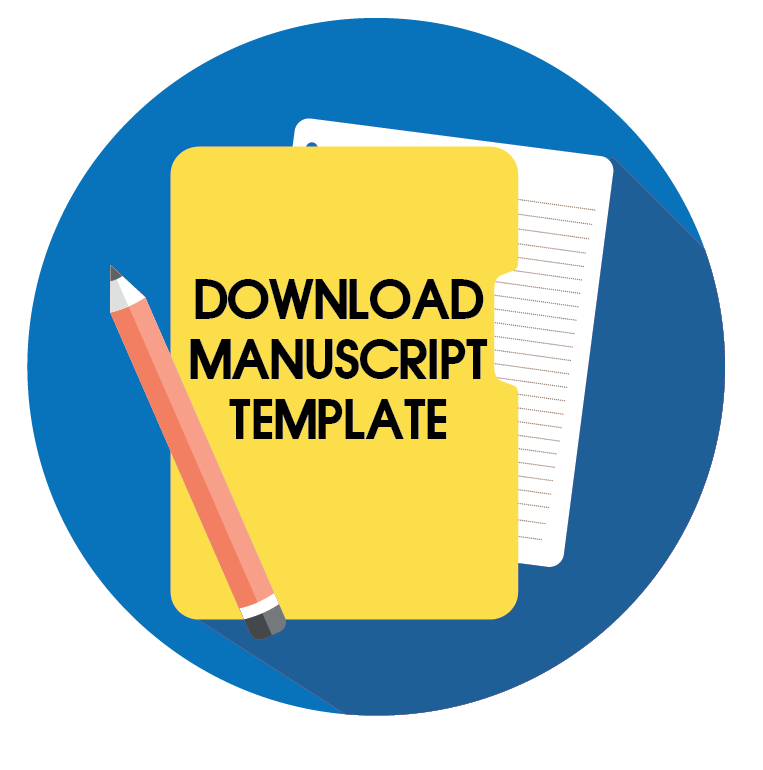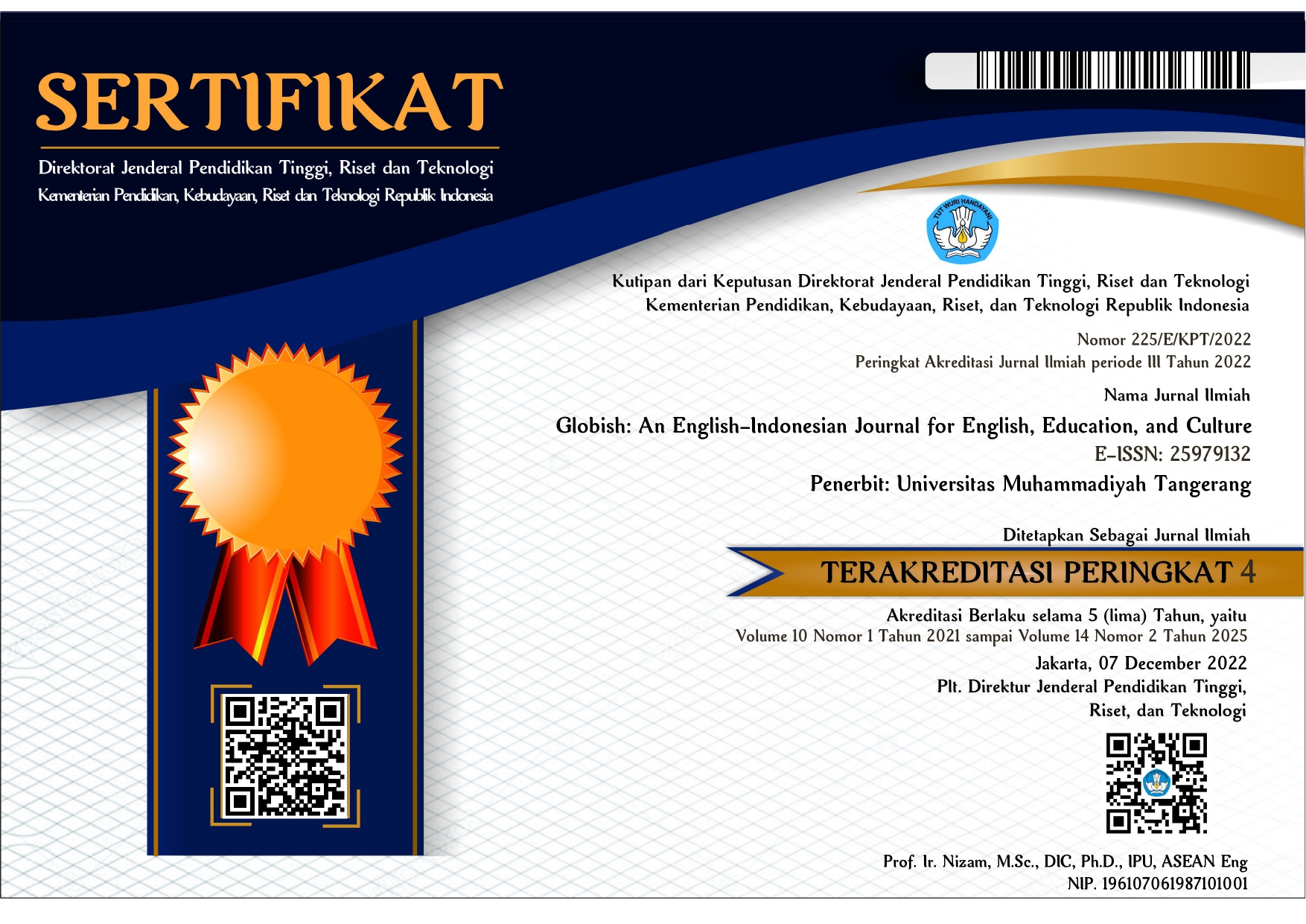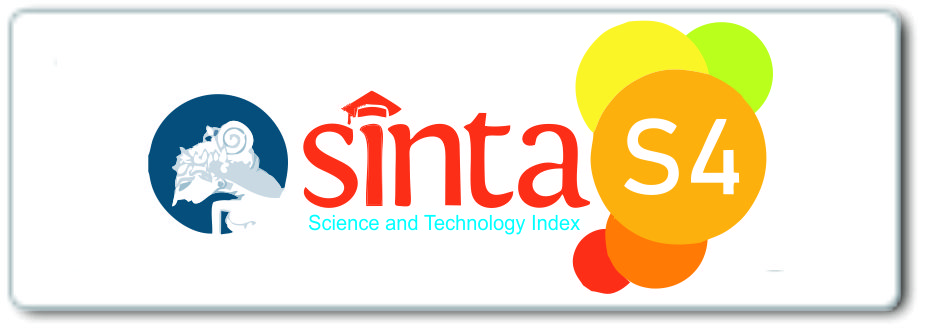Exploring Student Teachers’ Current Digital Competencies for Navigating Digital Education
Abstract
Along with the digital era enhancement, the criteria for qualified teachers to possess not only content and pedagogical knowledge but also technological competence. This study examined the digital competencies of 47 fifth-semester English education students at Sanata Dharma University. Grounded in the TPACK framework, this study explored student teachers’ competencies to integrate technology into English language teaching. This study used a mixed-methods approach. The qualitative data showed that student teachers demonstrated an average digital competency score of 76.87 (SD = 9.73). Qualitative findings revealed that student teachers' digital competencies are shown through innovative teaching practices, information literacy and evaluation, collaboration and resource sharing, responsible technology use, and technical know-how. The study's insights are expected to inform curriculum makers, educators, and policymakers about the current state of digital competencies among future English student teachers, allowing more targeted improvements in teacher education programs.
Keywords
Full Text:
PDFReferences
Alnasib, B. N. M. (2022). Digital competencies: Are pre-service teachers qualified for digital education? International Journal of Education in Mathematics, Science and Technology, 11(1), 96–114. https://doi.org/10.46328/ijemst.2842
Antonietti, C., Cattaneo, A., & Amenduni, F. (2022). Can teachers’ digital competence influence technology acceptance in vocational education? Computers in Human Behavior, 132, 107266. https://doi.org/10.1016/j.chb.2022.107266
Ary, D., Jacobs, L. C., Sorensen, C., & Walker, D. A. (2014). Introduction to research in education. Wadsworth Cengage Learning.
Braun, V., & Clarke, V. (2006). Using thematic analysis in psychology. Qualitative Research in Psychology, 3(2), 77–101. https://doi.org/10.1191/1478088706qp063oa
Chicaiza Chicaiza, R. M., Ramos Rivera, J. C., Camacho Castillo, L. A., Heredia Mendoza, E. M., & Tite Chicaiza, A. J. (2024). Enhancing EFL -English as a foreign language, education in virtual environments using kahoot. Ciencia Latina Revista Científica Multidisciplinar, 8(3), 908–926. https://doi.org/10.37811/cl_rcm.v8i3.11296
Cifuentes Rojas, M. T., Contreras Jordán, R. M., & Feijoó Rojas, K. J. (2024). Transforming efl (english as a foreign language) education in virtual environments through quizizz. LATAM Revista Latinoamericana de Ciencias Sociales y Humanidades, 5(3). https://doi.org/10.56712/latam.v5i3.2032
Cohen, L., Manion, L., & Morrison, K. (2007). Research methods in education (Sixth Edition). Routledge.
Creswell, J. W., & Clark, V. L. P. (2018). Designing and conducting mixed methods research (Third Edition). SAGE.
Creswell, J. W., & Creswell, J. D. (2022). Research design: Qualitative, quantitative, and mixed methods approaches (Sixth Edition). SAGE.
Dawadi, S. (2020). Thematic analysis approach: A step by step guide for ELT research practitioners. Journal of NELTA, 25(1–2), 62–71. https://doi.org/10.3126/nelta.v25i1-2.49731
Dias-Trindade, S., Moreira, J. A., & Gomes Ferreira, A. (2020). Assessment of university teachers on their digital competences. Qwerty. Open and Interdisciplinary Journal of Technology, Culture and Education, 15(1). https://doi.org/10.30557/QW000025
Falloon, G. (2020). From digital literacy to digital competence: the teacher digital competency (TDC) framework. Educational Technology Research and Development, 68(5), 2449–2472. https://doi.org/10.1007/s11423-020-09767-4
Fauzi, I., Juniardi, Y., & Wahyudin. (2023). Utilizing digital learning resources in English-specific purposes learning classroom: ESP teachers’ perspectives. Globish: An English-Indonesian Journal for English, Education, and Culture, 12(2), 153. https://doi.org/10.31000/globish.v12i2.8449
Fuaddudin. (2020). Perubahan paradigma mengajar guru dalam menyongsong penyelenggaraan pendidikan di era revolusi industri 4.0. EL-Muhbib: Jurnal Pemikiran & Penelitian Pendidikan Dasar, 68–81.
Guillén-Gámez, F. D., Mayorga-Fernández, M. J., Bravo-Agapito, J., & Escribano-Ortiz, D. (2021). Analysis of teachers’ pedagogical digital competence: Identification of factors predicting their acquisition. Technology, Knowledge and Learning, 26(3), 481–498. https://doi.org/10.1007/s10758-019-09432-7
Hasibuan, S. S., Dewi, U., & Daulay, S. H. (2022). A review of the literature on the development of english instructors’ tpack in indonesia. Jurnal As-Salam, 6(2), 214–228. https://doi.org/10.37249/assalam.v6i2.479
König, J., Jäger-Biela, D. J., & Glutsch, N. (2020). Adapting to online teaching during COVID-19 school closure: teacher education and teacher competence effects among early career teachers in Germany. European Journal of Teacher Education, 43(4), 608–622. https://doi.org/10.1080/02619768.2020.1809650
Law, N., Woo, D., de la Torre, J., & Wong, G. (2018). A global framework of reference on digital literacy skills for indicator 4.4.2. http://www.uis.unesco.org
Liza, K., & Andriyanti, E. (2020). Digital literacy scale of English pre-service teachers and their perceived readiness toward the application of digital technologies. Journal of Education and Learning (EduLearn), 14(1), 74–79. https://doi.org/10.11591/edulearn.v14i1.13925
Mailizar, M., & Fan, L. (2020). Examining Indonesian secondary school Mathematics teachers’ instructional practice in the integration of technology. Universal Journal of Educational Research, 8(10), 4692–4699. https://doi.org/10.13189/ujer.2020.081038
Martín-Párraga, L., Llorente-Cejudo, C., & Cabero-Almenara, J. (2022). Analysis of teachers’ digital competencies from assessment frameworks and instruments. International Journal of Educational Research and Innovation, 2022(18). https://doi.org/10.46661/ijeri.7444
Mishra, P., & Koehler, M. J. (2006). Technological pedagogical content knowledge: A framework for teacher knowledge. Teachers College Record: The Voice of Scholarship in Education, 108(6), 1017–1054. https://doi.org/10.1111/j.1467-9620.2006.00684.x
Naeem, M., Ozuem, W., Howell, K., & Ranfagni, S. (2023). A step-by-step process of thematic analysis to develop a conceptual model in qualitative research. International Journal of Qualitative Methods, 22. https://doi.org/10.1177/16094069231205789
Roberts, R. (2020). Qualitative interview questions: Guidance for novice researchers. The Qualitative Report. https://doi.org/10.46743/2160-3715/2020.4640
Selpia, D., & Purnawarman, P. (2021). Teacher technology uptake in Indonesian EFL classes. Proceedings of the Thirteenth Conference on Applied Linguistics (CONAPLIN 2020). https://doi.org/10.2991/assehr.k.210427.015
Silvana, H., Rullyana, G., & Hadiapurwa, A. (2019). Kebutuhan informasi guru di era digital: studi kasus di sekolah dasar labschool universitas pendidikan indonesia. BACA: JURNAL DOKUMENTASI DAN INFORMASI, 40(2), 147. https://doi.org/10.14203/j.baca.v40i2.454
Surayya, S. A., Asrobi, M., Maysuroh, S., & Farizi, Z. (2023). The development of an online-based TPACK questionnaire for ELT teachers. Englisia: Journal of Language, Education, and Humanities, 11(1). https://doi.org/10.22373/ej.v11i1.17364
Tomczyk, Ł. (2021). Declared and real level of digital skills of future teaching. Education Sciences, 11(10), 619. https://doi.org/10.3390/educsci11100619
Zaçellari, M., & Reçi, L. (2024). Empowering future teachers with media and literacy skills. Interdisciplinary Journal of Research and Development, 11(1), 54. https://doi.org/10.56345/ijrdv11n108
DOI: http://dx.doi.org/10.31000/globish.v14i2.13624
Article Metrics
Abstract - 1176 PDF - 293Refbacks
- There are currently no refbacks.
Globish
Program Studi Pendidikan Bahasa Inggris
Fakultas Keguruan dan Ilmu Pendidikan
Universitas Muhammadiyah Tangerang
Jl. Perintis Kemerdekaan I/33, Cikokol
Kota Tangerang, Indonesia
e-mail: globish_journal@umt.ac.id
Globish (p-ISSN: 2301-9913 | e-ISSN: 2301-9913) is licensed under a Creative Commons Attribution-ShareAlike 4.0 International License.









